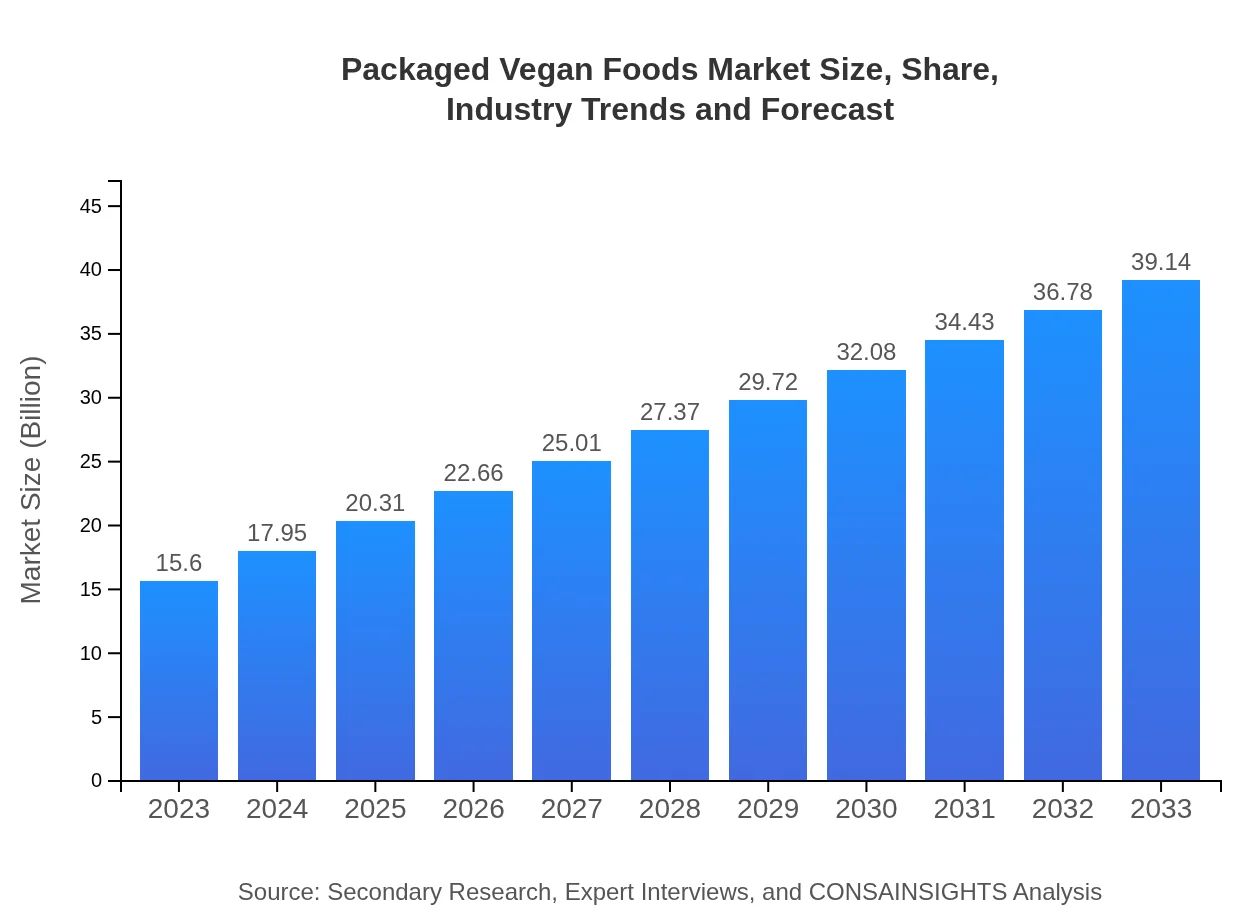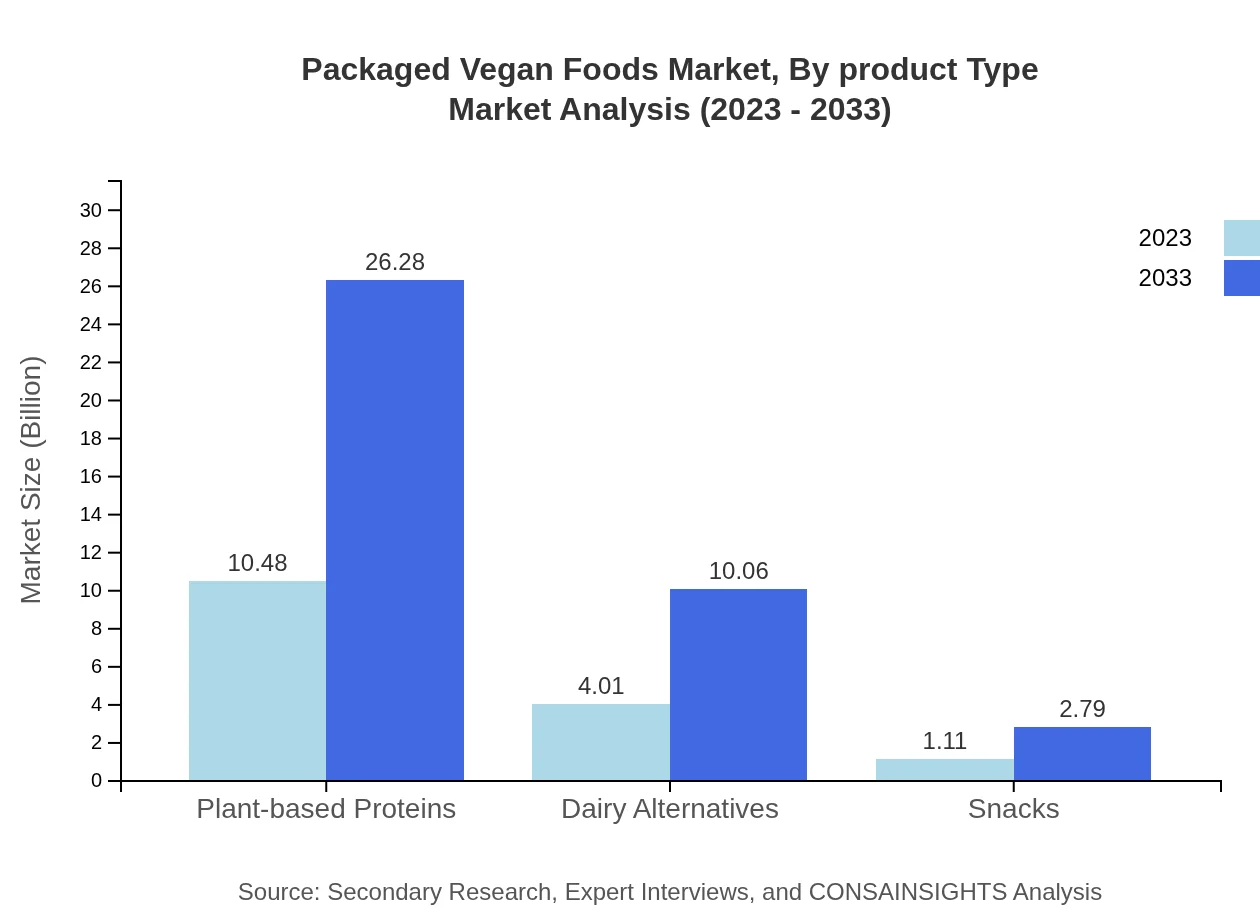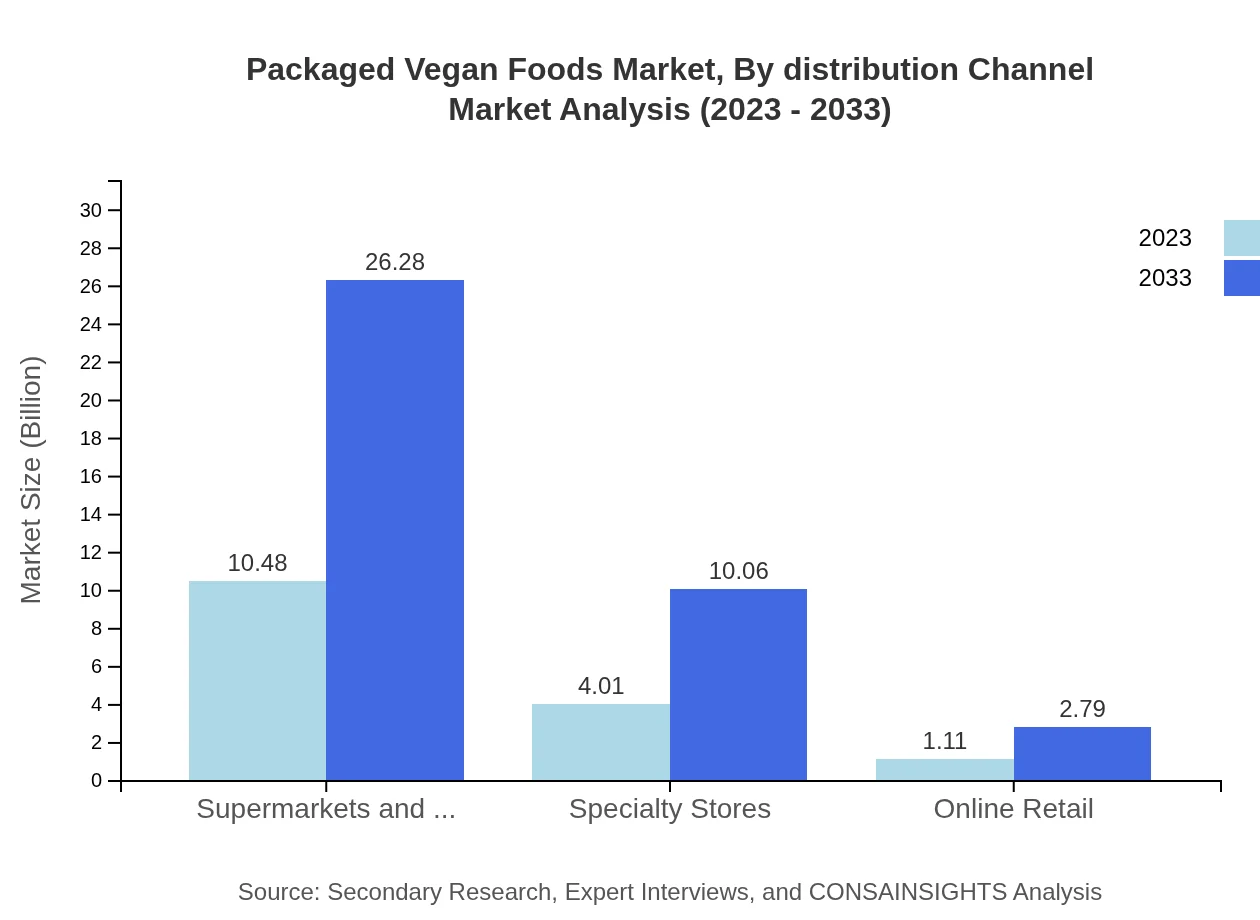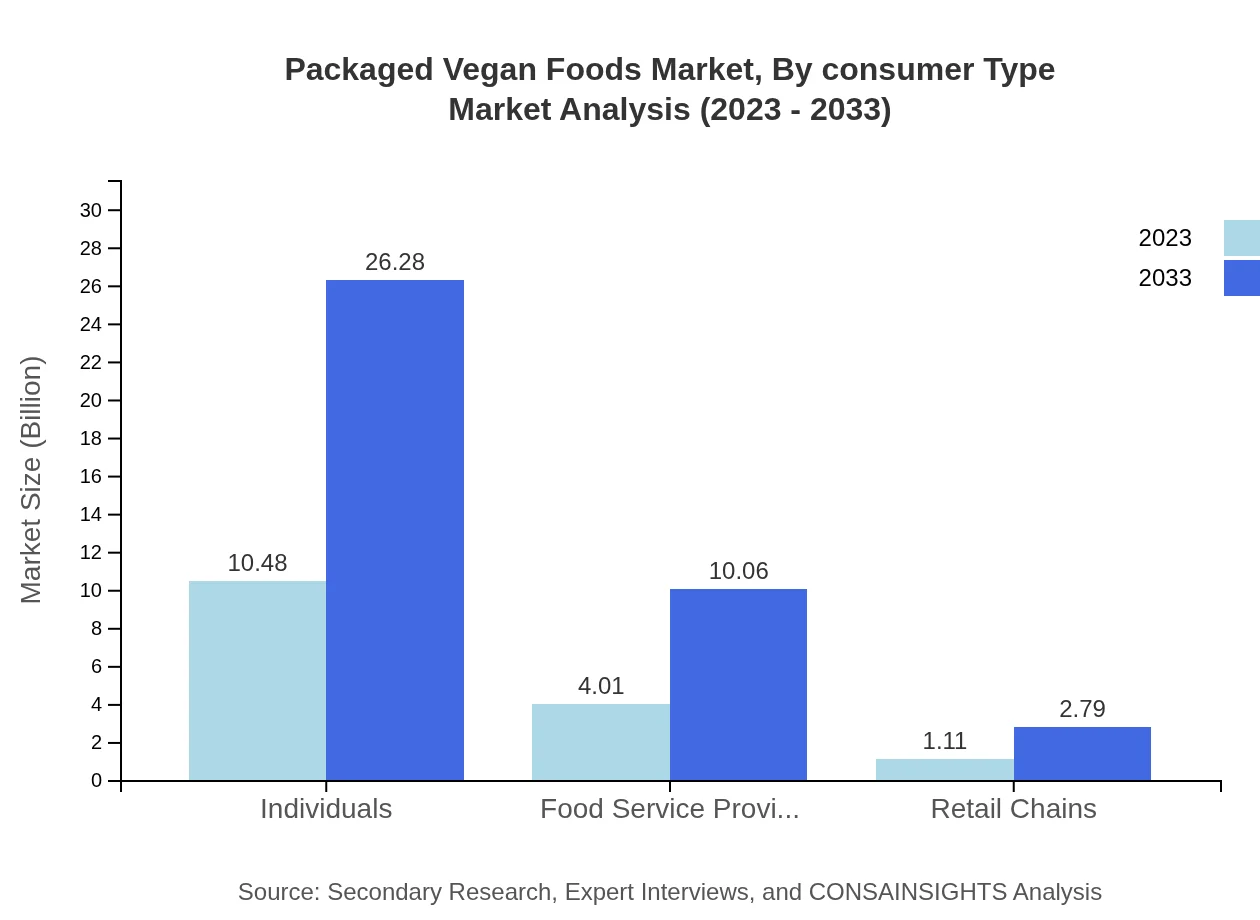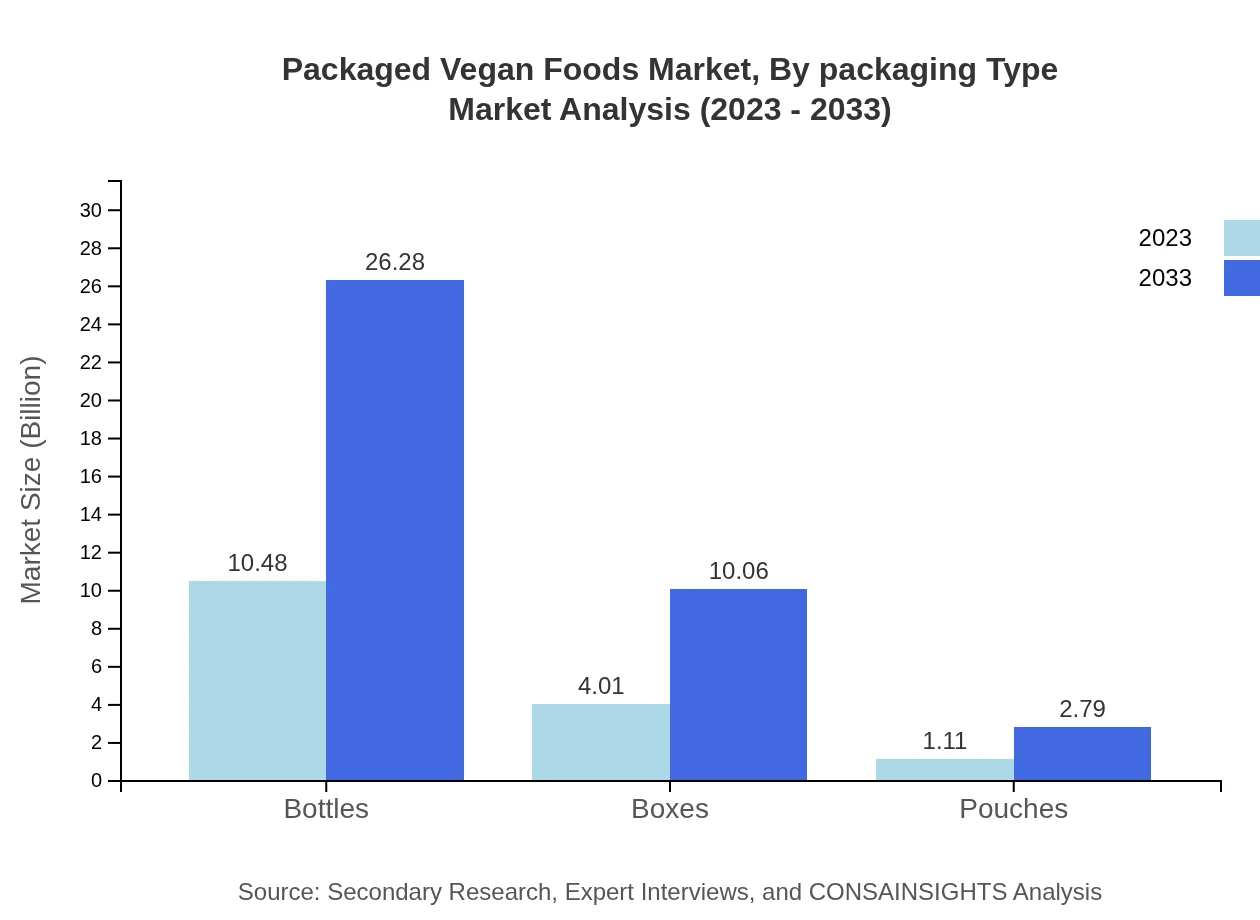Packaged Vegan Foods Market Report
Published Date: 31 January 2026 | Report Code: packaged-vegan-foods
Packaged Vegan Foods Market Size, Share, Industry Trends and Forecast to 2033
This report provides an in-depth analysis of the Packaged Vegan Foods market, covering current trends, segmentation, competitive landscape, and future forecasts from 2023 to 2033. Insights include market size, growth opportunities, and regional breakdowns essential for stakeholders in the industry.
| Metric | Value |
|---|---|
| Study Period | 2023 - 2033 |
| 2023 Market Size | $15.60 Billion |
| CAGR (2023-2033) | 9.3% |
| 2033 Market Size | $39.14 Billion |
| Top Companies | Beyond Meat, Oatly, Impossible Foods, Alpro, Daiya Foods |
| Last Modified Date | 31 January 2026 |
Packaged Vegan Foods Market Overview
Customize Packaged Vegan Foods Market Report market research report
- ✔ Get in-depth analysis of Packaged Vegan Foods market size, growth, and forecasts.
- ✔ Understand Packaged Vegan Foods's regional dynamics and industry-specific trends.
- ✔ Identify potential applications, end-user demand, and growth segments in Packaged Vegan Foods
What is the Market Size & CAGR of Packaged Vegan Foods market in 2023?
Packaged Vegan Foods Industry Analysis
Packaged Vegan Foods Market Segmentation and Scope
Tell us your focus area and get a customized research report.
Packaged Vegan Foods Market Analysis Report by Region
Europe Packaged Vegan Foods Market Report:
Europe's market for Packaged Vegan Foods is anticipated to grow from 4.70 billion USD in 2023 to 11.79 billion USD by 2033. The European market exhibits a strong preference for ethical consumption and sustainability, compelling food manufacturers and retailers to diversify their vegan product ranges, resulting in rapid market growth.Asia Pacific Packaged Vegan Foods Market Report:
In 2023, the Asia Pacific region's Packaged Vegan Foods market is valued at 2.72 billion USD, expected to grow to 6.81 billion USD by 2033. Increasing urbanization, rising disposable income, and a growing trend towards healthier eating are driving the market, along with the introduction of innovative plant-based products catering to local tastes and preferences.North America Packaged Vegan Foods Market Report:
North America holds a significant portion of the Packaged Vegan Foods market, valued at 5.87 billion USD in 2023, forecasted to grow to 14.72 billion USD by 2033. A substantial shift towards vegan and vegetarian lifestyles, driven by health, ethical concerns, and environmental sustainability is propelling market growth, along with robust product offerings across major retail chains.South America Packaged Vegan Foods Market Report:
The South America region's market for Packaged Vegan Foods in 2023 is valued at 0.33 billion USD, projected to reach 0.82 billion USD by 2033. This growth is primarily fueled by increased awareness about plant-based diets and the health benefits associated with them, making the market ripe for expansion.Middle East & Africa Packaged Vegan Foods Market Report:
The Packaged Vegan Foods market in the Middle East and Africa stood at 1.99 billion USD in 2023, expected to grow to 4.99 billion USD by 2033, as increasing expatriate populations and a surge in health-conscious consumers in urban regions drive demand for diverse vegan options.Tell us your focus area and get a customized research report.
Packaged Vegan Foods Market Analysis By Product Type
In 2023, the Packaged Vegan Foods market by product type is largely dominated by plant-based proteins, valued at 10.48 billion USD (67.15% market share). This segment is projected to grow to 26.28 billion USD by 2033. Dairy alternatives follow closely with a market size of 4.01 billion USD (25.71% share) in 2023, progressing to 10.06 billion USD by 2033. Snacks make up the remaining segment, with a market size of 1.11 billion USD (7.14% share) in 2023, expected to reach 2.79 billion USD by 2033.
Packaged Vegan Foods Market Analysis By Distribution Channel
The distribution channel analysis shows supermarkets and hypermarkets leading with 10.48 billion USD (67.15% share) in 2023, projected to reach 26.28 billion USD by 2033. Specialty stores account for 4.01 billion USD (25.71% share) with an expected growth to 10.06 billion USD. Online retail, though smaller at 1.11 billion USD (7.14% share), showcases significant potential for growth, projected to reach 2.79 billion USD by 2033.
Packaged Vegan Foods Market Analysis By Consumer Type
The consumer type segmentation reveals that individual consumers dominate the market, valued at 10.48 billion USD (67.15% share) in 2023, with projections to grow to 26.28 billion USD by 2033. Food service providers follow with a market size of 4.01 billion USD (25.71% share) in 2023, advancing to 10.06 billion USD by 2033.
Packaged Vegan Foods Market Analysis By Packaging Type
Packaging type analysis highlights that bottles, representing 10.48 billion USD (67.15% share) in 2023, are expected to grow to 26.28 billion USD by 2033. Boxes and pouches also contribute significantly, with 4.01 billion USD (25.71% share) and 1.11 billion USD (7.14% share) in 2023, respectively, expected to reach 10.06 billion USD and 2.79 billion USD by 2033.
Packaged Vegan Foods Market Trends and Future Forecast
Tell us your focus area and get a customized research report.
Global Market Leaders and Top Companies in Packaged Vegan Foods Industry
Beyond Meat:
Beyond Meat is renowned for revolutionizing the plant-based meat industry with a diverse range of products that closely mimic the taste and texture of conventional meats. Their continuous innovation and market expansion cater to the growing vegan and flexitarian consumer base.Oatly:
Oatly has established itself as a leader in the dairy alternatives sector, primarily focusing on oat-based products. Their commitment to sustainability and quality has made them a popular choice among health-conscious consumers.Impossible Foods:
Impossible Foods is at the forefront of plant-based meat alternatives, widely recognized for their flagship products that utilize cutting-edge technology to create meat-like textures and flavors that appeal to both vegans and meat-lovers.Alpro:
Alpro specializes in soy and plant-based dairy alternatives and has consistently extended its product range to accommodate shifting consumer tastes and a growing preference for lactose-free options, showcasing strong market growth.Daiya Foods:
Daiya Foods offers a wide array of vegan cheese alternatives, serving the growing demand for plant-based dairy products with innovative formulations that don't compromise on taste or texture.We're grateful to work with incredible clients.









FAQs
What is the market size of packaged Vegan Foods?
The packaged vegan foods market is currently valued at approximately $15.6 billion in 2023, with an expected CAGR of 9.3% through to 2033. This growth reflects an increasing consumer interest in health-conscious, sustainable food options.
What are the key market players or companies in the packaged Vegan Foods industry?
Major companies in the packaged vegan foods market include Beyond Meat, Impossible Foods, and Oatly. These key players are pivotal in innovation, offering a range of plant-based products that cater to diverse consumer preferences.
What are the primary factors driving the growth in the packaged Vegan Foods industry?
The growth in the packaged vegan foods industry is driven by increasing health awareness, rising environmental concerns, and a shift towards plant-based diets fueled by lifestyle changes and dietary trends.
Which region is the fastest Growing in the packaged Vegan Foods market?
The fastest-growing region in the packaged vegan foods market is Europe, projected to grow from $4.70 billion in 2023 to $11.79 billion by 2033, reflecting significant demand for plant-based offerings.
Does ConsaInsights provide customized market report data for the packaged Vegan Foods industry?
Yes, ConsaInsights offers customized market report data catering to the unique needs of clients in the packaged vegan foods industry, ensuring tailored insights that reflect specific market dynamics.
What deliverables can I expect from this packaged Vegan Foods market research project?
From the packaged vegan foods market research project, clients can expect detailed market analysis reports, forecasts, segment data, and actionable insights that guide strategic decisions.
What are the market trends of packaged Vegan Foods?
Current market trends in packaged vegan foods include a significant increase in plant-based protein products, with projected growth from $10.48 billion in 2023 to $26.28 billion by 2033, highlighting consumer shifts towards sustainable choices.

